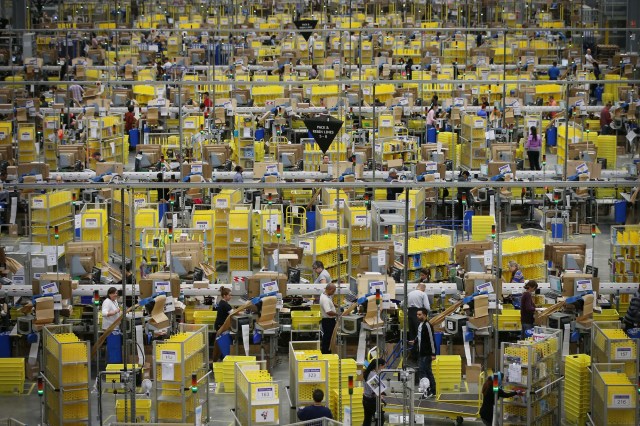Credit: Peter Macdiarmid/Getty Images

Amazon founder Jeff Bezos’ core innovation isn’t selling stuff online, it’s fixating on making customers happy – and not being much bothered about turning a profit. Plainly it works. He’s already the world’s richest man.[1. Amazon’s latest profit was a meagre 3.8% on a turnover of $51 billion. For comparison, Facebook is more like 33%.]
And he has the rare luxury of investors committed to the long term, so he’s free to build market share, cut costs and prices, and diversify into fresh sectors. He’s already building rockets, selling high-end groceries, and publishing the Washington Post newspaper; and Amazon Web Services is the world’s largest supplier of cloud computing storage to governments.
It’s no surprise then that his latest move, a jump into the highly profitable market in prescription drugs, has everyone’s attention. By snapping up start-up PillPack he wiped $11 billion off the shares of Walgreens, CVS, and RiteAid, the three major US prescription retailers.
It’s a huge industry: Americans, particularly older Americans, take a lot of pills. According to a recent report by Sandra Boodman in the Washington Post “Researchers estimate that 25 percent of people ages 65 to 69 take at least five prescription drugs to treat chronic conditions, a figure that jumps to nearly 46 percent for those between 70 and 79.”
Hence PillPack’s product. Once a month they send people who take drugs long-term a batch of “pillpacks” – little envelopes printed with the time and day for every pill or batch of pills you need to take.
Handy though it is, it’s hard to believe that’s why Bezos paid a rumoured $1 billion for the company.
As with the Whole Foods purchase, Amazon is jumping into a completely new market by buying a going concern – which is especially useful in this instance given the high regulatory barriers to entry in the pharmacy world. In its five short years PillPack has done the heavy lifting – it’s already licensed to operate in 49 of the 50 states.
Amazon’s enormous retail market – a staggering 64% of US households have signed up for Prime – gives them a big advantage. As with Whole Foods, we should expect discounts for Prime members who sign on to PillPack and vice versa. And given that Amazon’s users tend to be younger, while PillPack’s are older, the acquisition brings big new demographic opportunities.
This will soon go well beyond the traditional mail-order drug market, and that’s why it’s scaring the big retailers. Amazon has been pioneering same-day delivery – and now offers it in two-hours in many locations. Expect a whole new market for urgent, one-off, prescriptions – where the mail-order providers have never been able to compete. No need to drive to Walgreens and hang around for an hour to get your migraine painkiller or your kid’s antibiotics. When the doctor hits send with the prescription, Amazon gets to work and your pills could beat you home.
Yet it’s likely Bezos has his sights set even higher. The US drug market itself is enormous: $580 billion in 2017 and notorious for bloated prices. One reason? The industry has consistently used its political punch in Washington to avoid competition. President Obama submitted to their trade group PhRMA’s demand that the “Obamacare” reforms leave their prices alone (there would have been government buying power to pull them down).
President Trump is the latest leader to curry public favour by asking them to lower their prices while doing nothing about it (a new report in Politico notes that hundreds of drug prices have actually just been increased).
It’s worth remembering how Bezos began his empire: by selling books online and using cut-throat tactics to force publishers to go along with him. In the book trade he operated what economists call a monopsony; a monopoly buyer who can dictate prices to suppliers just as a standard monopolist dictates them to consumers. Book publishers, mostly small companies with few political friends, had little choice but to give in.
So here’s the big question: is his plan to go after the drug companies next? And if he does – with his enormous market base, two-thirds of all American households – will he succeed?
It will be a much more equal fight than that against the book sellers. At a market value of $800 billion, Amazon is worth around the same as the four largest pharmaceutical companies together. If his market clout can arm-wrestle them into more competitive pricing then that’s a good thing.
But one thing is clear, PhRMA is not the book trade. Any anti-competitive antics from Amazon won’t just be met in the market place but in the corridors of power where pharmaceutical lobbying is constant. It will be a battle royale, and the winner will be consumers.










Join the discussion
Join like minded readers that support our journalism by becoming a paid subscriber
To join the discussion in the comments, become a paid subscriber.
Join like minded readers that support our journalism, read unlimited articles and enjoy other subscriber-only benefits.
Subscribe